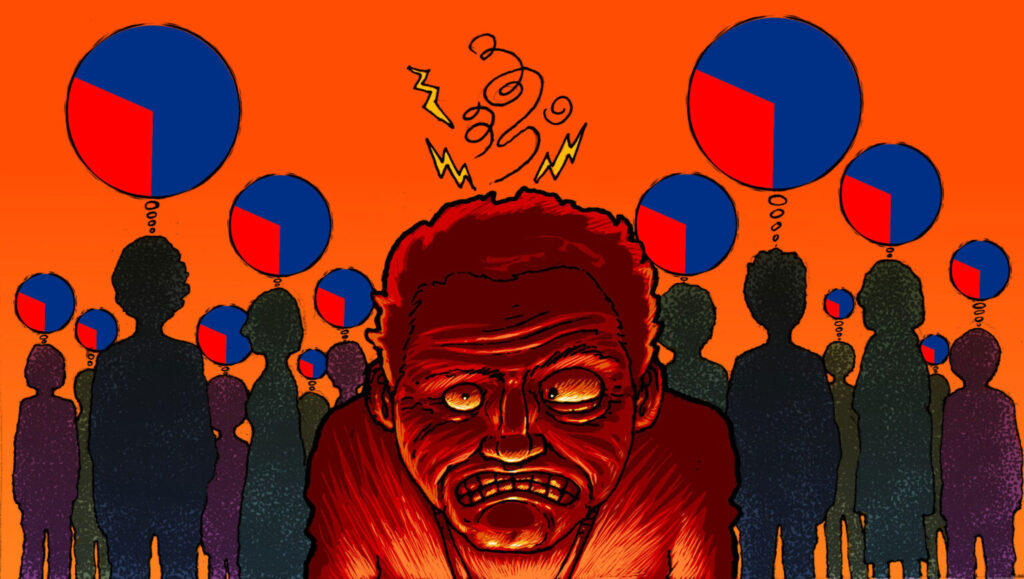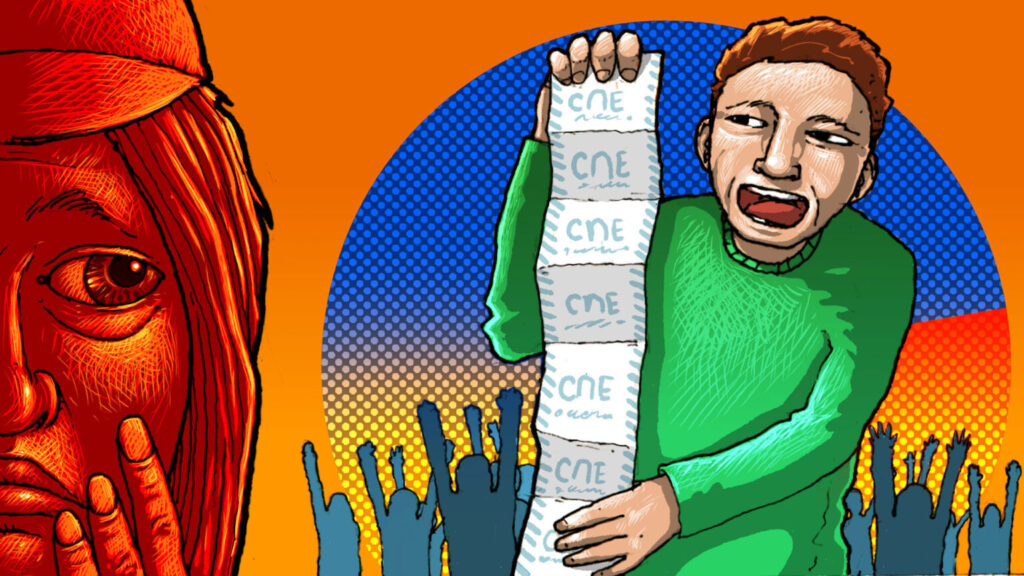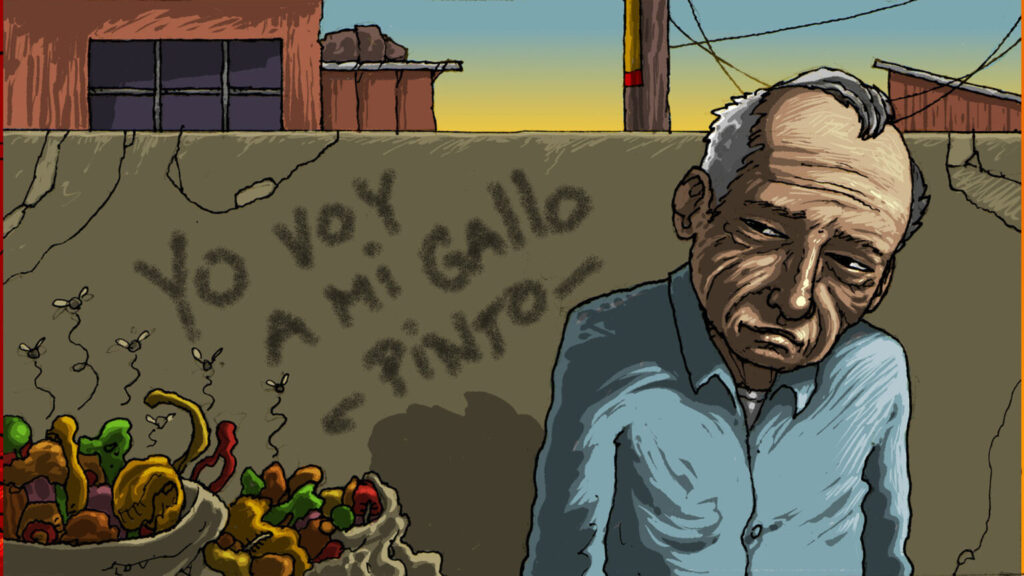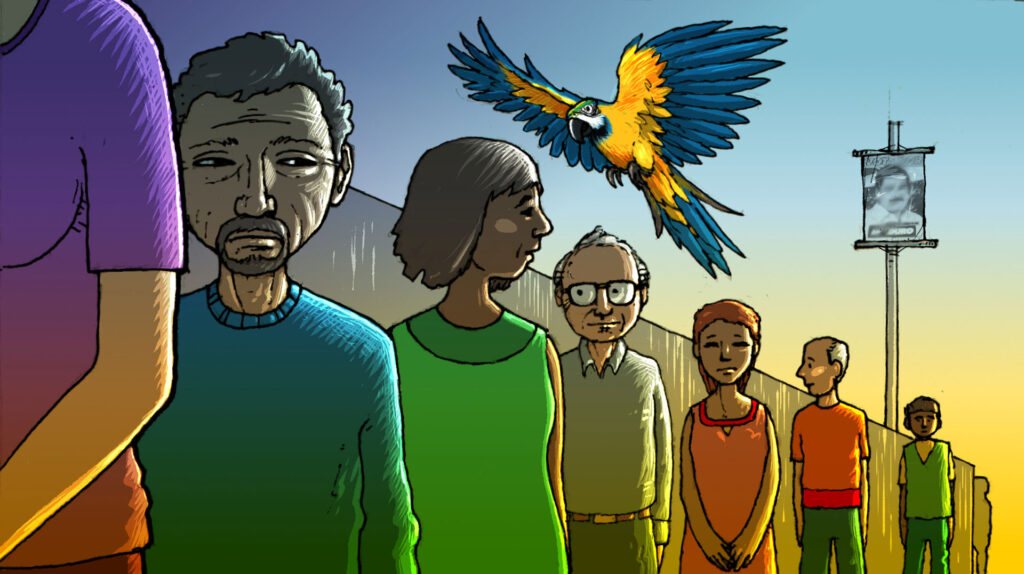The Missing Link of the July 28th Election
The night of the July 28th election, hundreds of thousands of people saw the actas, and not only the opposition’s witnesses who kept copies. Two PSUV witnesses and a chavista community leader share their experiences


This story was originally published in Spanish by La Vida de Nos as part of the #LaHoraDeVenezuela initiative.
Many people probably did the math after the July 28th election: if there were 30,026 polling stations for the July 28 presidential election in Venezuela, each manned by one president, one machine operator, one secretary, one principal member, and witnesses from various parties, it means that thousands saw and signed the tally sheets. This doesn’t even include the military personnel deployed to safeguard every election in Venezuela, specifically tasked with guarding all electoral material.

Nearly a month after the election, the National Electoral Council (CNE) still hasn’t released the results by polling station, nor have they conducted the audits that were supposed to follow the election. Just hours after the polls closed, Nicolás Maduro was declared the winner, and this was ratified by the Supreme Court on Thursday on August 22nd, in a ruling that suggests Venezuelans may never officially see the detailed data that support his victory, while paving the road for the prosecution of those responsible for publishing the 25,073 digitized tally sheets gathered by opposition witnesses and posted on a website, which show that Edmundo González won with a comfortable 67% of the vote.
Between these two results, there’s a missing link: the witnesses from the Partido Socialista Unido de Venezuela (PSUV)—Maduro’s party—and its allies, who also had copies of the tally sheets in their possession.
Is it fear that has kept them silent? Have they received an order they don’t dare to defy? Do they themselves doubt the results announced by the CNE?
Additionally, can they confirm that the tally sheets they hold or handled on election day are the same as those published by the opposition?
Furthermore, being citizens themselves, and with some belonging to chavista grassroots, haven’t they witnessed first-hand that PSUV didn’t get the votes the party expected?
What follows are three stories that break the silence: two from PSUV electoral witnesses and one from a community leader from the chavista grassroots. We’ll call them Karla, Daria, and María Eugenia.

“I’m chavista, but I don’t cheat”
Karla extends her arm and shows an acta from July 28. She searched frantically through the folders and papers piled on the living room table in her apartment, on Venezuela’s central coast. She had stored it so carefully that she forgot the exact spot where she placed it the morning after the election, after having served as an electoral witness for PSUV at a voting center in the city of La Guaira.
“This is the fifth election I’ve worked as a PSUV witness. I’m a registered party member and a spokesperson for the UBCH (Units of Battle Hugo Chávez, a grassroots PSUV organization) in my area,” she says, waving the tally sheet like a white flag seeking a truce.
For Karla, everything she’s achieved is linked to her involvement with the Bolivarian Revolution. She graduated from the Misión Ribas—an early government program to expand the access to high school education—and kept studying thanks to Misión Sucre, a similar program to grant access to university-level education focused on a social agenda. Karla then moved from an overcrowded annex, to the apartment where she now lives, also provided by the Venezuelan government. She has worked for a decade in the public sector, at a ministry-affiliated organization.
She believed these elections would be no different from the others—that they would win and celebrate, collect the tally sheets and deliver them to the local electoral coordinator, conduct the audit, and be done. But that’s not what happened.
“After noon, it turned into a hateful day, full of odd tension. In my voting center, Maduro won by a few votes. But in La Guaira the opposition wiped us out. The other PSUV witnesses were posting the numbers in our WhatsApp group, and it was unbelievable. They beat the hell out of us.”
Then, CNE announced in its first bulletin that Maduro had won “irreversibly” with 51% of the votes. “How did we win?” Karla asks. “This is crazy. Chavismo always wins in La Guaira, and this time it didn’t happen.” She keeps asking herself questions. “Why do I feel so sad if we won?” “Why wasn’t there even a hint of celebration?” “Why, if we won, did they erase the WhatsApp evidence and forbid us, the witnesses, from talking about the election day?”
She asks out loud as she smooths the wrinkles in the tally sheet, without success. Karla believes that the country’s economic crisis was caused by international sanctions and the opposition. “But I also know that on our side, we’ve made plenty of mistakes, which is why so many people didn’t even want to vote. Filling that 1×10 list cost me blood, sweat, and tears,” she says, referring to the list of voters that PSUV required his witnesses and grassroots to complete.
In the weeks leading up to the election, she attended meetings with the regional PSUV leadership, where they were warned about alleged “destabilizing plans by the opposition.” Karla and others were told to “stay alert” and protect Maduro’s votes because the opposition had a plan to disrupt the tally, and that would be solved by showing the tally sheets.
Around 2:00 p.m. on election day, the coordinator at her center told everyone that “by orders from above,” they would only print one tally sheet per table, not one for each witness. Karla complained because she hadn’t been told this by the party, but the coordinator reminded her that they were on the same team and that she shouldn’t be foolish.
“But I refused. I wanted my tally sheet and for the opposition guy to get his, too. Because I’m chavista, but I don’t cheat. They (the party) had told us that having these sheets was the most important thing. That’s why I fought for the one from my table. Now they’re telling me that if I want to, I can throw it away. How can I be happy when I struggled to get that tally sheet and no one cares about it?”
She also didn’t like that, even though there were no voters at her center after 3:30 p.m., they kept it open until almost 6:00 pm. She remembers everything from that day. The vote count began, and her table’s tally sheet was printed at 7:12 pm. The opposition witnesses refused to leave until the data was transmitted. The machine technician said the transmission was slow, and people outside the center began pressuring them. After 9:00 p.m., they were told that the transmission had been completed successfully, and the WhatsApp group told them to go home.
That’s what she did. She went to bed with a headache, convinced they had lost the election. But when she woke up, she saw her WhatsApp groups flooded with messages saying they had won. “But no one was happy. There were lots of complaints directed at the grassroot leaders, the public employees…”
Another question haunts her: “If we won, why were they demanding loyalty from us and reminding us that we don’t have official property documents for the apartments we’d been given? I thought: these people are making fools of themselves. Now, the ones who really didn’t vote for PSUV are going to hate us even more. That’s why I say it’s a victory filled with sadness and disappointment.”
Karla searched for the tally sheet from her table on the website where the opposition posted the ones collected by their witnesses. It’s identical to hers.
And again, what if…
“If they uploaded the tally sheet where their candidate lost, and I know it’s real because I have it here, why should I doubt, or think that the others they uploaded are fake?”
She no longer knows what to think, though there’s one thing Karla says she’s sure of: people’s will must be respected because that’s what living in a democracy means.
“I don’t want to live in a dictatorship, even if I’m a PSUV member. I can be with PSUV, but I don’t think it’s right not to respect the votes of those who went out to vote. Everyone here knows I was a witness, and that’s why my neighbors look at me strangely, like I did something wrong. That’s why I don’t even want to keep the tally sheet at home anymore, because no one from PSUV has come to ask for it. If this is proof of the opposition’s cheating, if that alleged hacking really happened, why aren’t they coming to those of us who were witnesses to clarify this once and for all?”

If your candidate won, I will tell you
As in every election over the past seven years, Daria was called to serve as an electoral witness for PSUV. In her neighborhood, the only one who was ever capable of beating the opposition was Hugo Chávez, as she remembers it. Apart from that, the opposition has always won. On July 28, she knew it wasn’t going to be any different. She expected that the opposition’s candidate would get more votes than Maduro, at least in the center where she was a witness. She wasn’t registered to vote there, but they sent her anyway, against the CNE’s own rule stating that witnesses should be voters from the same center.
And it went as she expected. By midday, she could feel it. After seeing the center crowded with voters in the morning, she knew most of them were opposition supporters. She felt afraid just imagining a victory led by María Corina Machado primaries but was disqualified by the Comptroller General, passing her candidacy first to academic Corina Yoris -who wasn’t allowed to register- and then to González. Daria feared a crackdown on chavistas like herself, a witch hunt, a purge, revenge.
After 4:00 p.m, when voters were scarce, she felt tension around her increase. She was the only PSUV witness at her center, and she believed she saw intimidating looks from the others. But by 7:00 p.m, she took a deep breath: other party members were assuring her in the chats that Maduro had won the election. Daria also felt victorious. She began recalling comments at the school where she worked, from upper-middle-class and wealthy parents, whom she suspected would ultimately vote for Maduro. These were people involved in imports or high-cost services who, although they spoke of wanting change, seemed to her more like “enchufados” -those who profited from shady connections with the government-.
That afternoon, around 6:00 pm, she saw voters returning, wanting to witness the public tallying of votes. In the days before Sunday, Daria had kept an eye on the opposition’s communications and speeches, where they stressed the defense of the vote and the safeguarding of tally sheet copies. She attributed the “defensiveness” of the citizens crowded at the center ‘s doors, especially the witnesses from the Mesa de la Unidad Democrática (MUD), to this messaging.
She decided to call for calm: “Stay calm, neighbors. If your candidate won, like has happened before, I will tell you. I’m not going to get into an unnecessary problem. I live here; my kids live here, and we will keep seeing each other every day”, she told them.
But it was hard to calm the crowd down—neither she nor the Plan República officers were able to do so.
The tension increased when a technical failure prevented the tally sheet from being printed. Daria’s only thought was that she didn’t want to be attacked. She didn’t want confrontation. Her entire family had been PSUV members since the early years of Chávez. She had been active in cooperatives working for the community. Social causes had always driven her, which was why she decided to join chavismo. Though she acknowledged that there had been corruption and mistakes that had veered the socialist model off course, she struggled to accept a different leadership, or believe that the promised change could be real. If the persecution she feared began -in the streets, homes, and government institutions- she thought she might be ready to leave the country.
Finally, at 10:30 p.m, the machine printed the tally sheet for her table. Each member and witness received a copy with the respective QR code. The numbers showed Edmundo González winning, as Daria had predicted, by about 300 votes.
She wasn’t worried. She believed in what had been said earlier: she was sure of Maduro’s victory, which was later confirmed by the CNE’s results.
Back at home, an hour after the declaration by Elvis Amoroso, president of the CNE, she tuned in to the digital channel she usually listened to for the opposition’s perspective. “Venezuela has a new president-elect, and it’s Edmundo González Urrutia,” she heard María Corina Machado announce. She couldn’t believe it. And she was even more surprised when she heard that the opposition had 40 percent of the tally sheets proving their victory.
The next morning, amid spontaneous protests rejecting the official announcement in various working-class areas of Caracas, including her own, Daria felt nervous again. She asked her family not to go out. She could hear her neighbors shouting, angrily cursing Maduro and those who supported him.
That night, the opposition made public a website where anyone could verify the acta from their polling booth. It wasn’t easy -the platform was overwhelmed- but after several attempts, Daria was able to log in. She entered her ID number and saw, displayed across the page, the tally sheet from her table—the same one she had as a witness.
She hesitated and then checked someone else’s ID from another, distant center. Same thing. It was the identical tally sheet her friend, also a PSUV witness, had received.
As the days passed, she returned to the site. With 83.5 percent of the tally sheets counted, González’s votes totaled 67 percent. Daria became filled with uncertainty. She thought that perhaps the opposition candidate “had what it took to win” after all. Maybe not by such a wide margin, but he could have won.
She asked herself: “But why have the protests calmed down? If the opposition is so sure they won, why aren’t they still out in the streets?” It’s something she still hasn’t found answers for, just like she hasn’t figured out why the CNE has not published, almost a month after the election, the results, disaggregated table by table, tally sheet by tally sheet.

It was as if people knew who to vote for
The streets of the rural settlement where María Eugenia lives haven’t seen asphalt. There’s no public transport, and cell phone service is very spotty. She has lived there, on the outskirts of Ciudad Bolívar, in southern Venezuela, for 26 years except for the six she spent in Barinas, the birthplace of Hugo Chávez, where her connection with chavismo began.
María Eugenia always enjoyed community work: giving talks to the elderly, helping with health campaigns, protecting animals, anything where she could lend a hand. When she arrived in Barinas, she completed high school through the Misión Ribas program. She became a chavista and remains one at 48. However, she quickly clarifies that she’s not a Maduro supporter—she’s certain there’s a distinction between him and Chavez.
After returning to Ciudad Bolívar, she felt grateful once more when, through the Ministry of Women’s Affairs, she was able to have surgery for fibromatosis. She coped with the depression of feeling unwell by throwing herself into more community work. She joined the Misión Ribas program in her parish, gave talks, and tried to help the most vulnerable students. She fought for resources to build houses for them. She regained strength by feeling useful.
In time, her community began seeing her differently. She wasn’t just another neighbor; she was a leader committed to social work. She was nominated as community leader, a role in the chavista grassroots structure that bridges the political efforts led by the head of the UBCh (whose mission is to defend the revolution) and community leaders. She became part of what she calls the “grassroots chavismo.”
As the presidential election approached, María Eugenia was given the task of securing a minimum of 90 votes for PSUV. Her community had about 300 residents, a little more than half were eligible to vote. She encouraged them in her own way: “Don’t let someone else vote for you,” “If you want things to improve, you need to vote…”
She didn’t tell them to vote for Maduro. She knew it wasn’t easy to convince everyone. For the construction of 20 houses, they were given MDF boards -wood waste- for roofing, which didn’t last through two rainy days. It took two years to replace them with zinc sheets. At political events, they were barely given water. She knew that her community, being so small, was among the most forgotten in the parish. Without work, the young men had to risk their lives in the gold mines in the south of the state. Her nephews had left for the mines or Brazil. She herself survived on a government salary of 220 bolivars a month and 1,390 bolivars in bonuses (around $39 in total). Even with the “economic war bonus” of 3,288 bolivars ($79), it wasn’t enough.
No, she didn’t tell them to vote for Maduro, only to vote according to their conscience.
“But people moved on their own,” she says, as if it’s a revelation. “We didn’t have to go fetch them from their homes like in all the other elections. People went to vote because they wanted to. It was like they knew who to vote for.”
And that wasn’t the only unusual thing about Sunday, July 28.
It was a traumatic election. All day there was tension. On the chat, they told us to stay alert, that there might be trouble, that the opposition would send motorcycles to scare us, that they could cut the power. I felt like they were terrorizing us for no reason. In our community, we’ve never fought over politics. We joke about it instead.
That day, she was responsible for providing food for her 17 street leaders and writing down the name of every neighbor who voted in her center. She was one of the first to vote.
And as dusk fell, the most unusual thing happened: the chat exploded with messages saying they had lost in almost all the centers in the parish. The UBCh heads were furious, demanding explanations, hysterical.
A parish where they had never, ever lost. A community where they had always won by a landslide.
In her voting center, with only one voting table, in a school that had started under a mango tree and gradually gained walls and a roof, Maduro won by just a tiny margin.
One of only 74 stations where the opposition lost, according to the tally sheets gathered by its witnesses from 1,129 stations across Bolívar state.
She didn’t get to see the tally sheet from her table because she went home, because she left before it was printed. She hasn’t been interested in seeing it either. In the community, they say Maduro won by very little votes. She doesn’t know, but according to the tally sheets collected and published by the opposition, the margin was a bit larger. But it makes no difference, winning by so little is unimaginable. Something María Eugenia never would have thought possible but somehow sensed.
“That’s why we didn’t have to fetch them from their homes like in all the other elections. People knew what they wanted… I knew what I wanted: so I have to confess, I voted for Edmundo González. And I haven’t lost hope, like many in my community, that justice will be served.”
Caracas Chronicles is 100% reader-supported.
We’ve been able to hang on for 22 years in one of the craziest media landscapes in the world. We’ve seen different media outlets in Venezuela (and abroad) closing shop, something we’re looking to avoid at all costs. Your collaboration goes a long way in helping us weather the storm.
Donate




